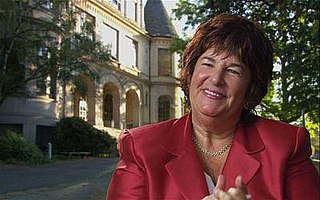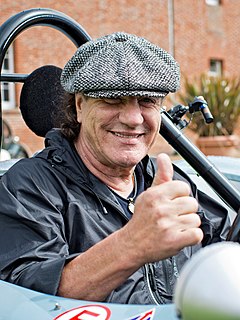A Quote by Ambrose Bierce
Brain, v. [as in "to brain"]: To rebuke bluntly, but not pointedly; to dispel a source of error in an opponent.
Related Quotes
Everyone uses the brain at every moment, but we use it unconsciously. We let it run in the background without realizing the power we have to reshape the brain. When you begin to exercise your power, the everyday brain, which we call the baseline brain, starts to move in the direction of super brain.
As human, we all have the same human potential, unless there is some sort of retarded brain function. The wonderful human brain is the source of our strength and the source of our future, provided we utilize it in the right direction. If we use the brilliant human mind in the wrong way, it is really a disaster.
Autism is a neurological disorder. It's not caused by bad parenting. It's caused by, you know, abnormal development in the brain. The emotional circuits in the brain are abnormal. And there also are differences in the white matter, which is the brain's computer cables that hook up the different brain departments.
Ew. Someone put the dog out, "Rosalie murmured wrinkling her nose. Have you herd this one, Psycho? how do a blond's brain cells die?" She didn't say anything. Well?" I asked."Do you know the punch line or not?" She looked pointedly at the TV and ignored me. Has she heard it?" I asked Edward. No." He answered. Awesome. So you'll enjoy this, bloodsucker--a blond's brain cells die alone.
The brain cannot multitask. Multitasking, when it comes to paying attention, is a myth. The brain naturally focuses on concepts sequentially, one at a time…To put it bluntly, research shows that we can’t multitask. We are biologically incapable of processing information-rich inputs simultaneously…Studies show that a person who is interrupted takes 50 percent longer to accomplish a task. Not only that, he or she makes up to 50 percent more errors.
We live in the Age of the Higher Brain, the cerebral cortex that has grown enormously over the last few millennia, overshadowing the ancient, instinctive lower brain. The cortex is often called the new brain, yet the old brain held sway in humans for millions of years, as it does today in most living things. The old brain can't conjure up ideas or read. But it does possess the power to feel and, above all, to be. It was the old brain that caused our forebears to sense the closeness of a mysterious presence everywhere in Nature.
Since functional brain imaging first emerged, we have learned that there aren't very many brain regions uniquely responsible for specific tasks; most complex tasks engage many if not all of the brain's major networks. So it is fairly hard to make general psychological inferences just from brain data.































